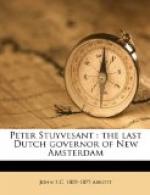“It was winter when I visited the Dutch governor. I stood the great part of a winter’s day, knocking at his door. He would neither open it nor suffer others to open it, to let me in. I found no proposal to stir me up against the English, my friends.”
Mixam, another of these chiefs, replied, “I do not know of any plot that is intended by the Dutch governor against the English, my friends.”
The third of the chiefs, who was conferred with, Pessacus, was still more emphatic in his denial. “Though I am far away,” he said, “from the governor of the Dutch, I am not willing for the sake of pleasing the English, to invent any falsehood against him.”
The result of these investigations led some to suppose that individuals among the English had originated these rumors, and had bribed some of the Indian chiefs to false charges that they might instigate the governors to send out an expedition for the capture of New Netherland.
Still the Council was unsatisfied, and retained its suspicions. Governor Stuyvesant. hearing of the charges against him, wrote at once to the governors of Massachusetts and New Haven, unequivocally denying the plot, and offering to come himself to Boston “to consider and examine what may be charged, and his answers.” Should the Council prefer, he would send a delegate to Boston, or they might send delegates to Manhattan to investigate the whole affair.
The Council decided to send three commissioners, men of note, to Manhattan. At the same time an army of five hundred men was ordered to be organized “for the first expedition,” should “God call the colonies to make war against the Dutch.”
The New England agents were hospitably received at New Amsterdam. They urged that the meeting should be held in one of the New England colonies, where Stuyvesant “should produce evidence to clear himself from the charges against him.” He was to be regarded as guilty until he proved himself innocent.
The Puritan agents appear to great disadvantage in the conference which ensued. “They seem to have visited the Dutch,” writes Mr. Brodhead,
“as inquisitors, to collect evidence criminating the Dutch and to collect no other evidence. And, with peculiar assurance, they saw no impropriety in requiring the authorities of New Netherland, in their own capital, to suspend their established rules of law in favor of those of New England.”
Governor Stuyvesant repressed every expression of impatience, and urged the most friendly overtures. It may be said that it was manifestly for his interest to do so, for the Dutch colonies were quite powerless compared with the united colonies of New England. The New England agents ungraciously repelled his advances, and at length abruptly terminated the conference without giving the governor an opportunity to prove his innocence. At nine o’clock in the evening they suddenly took leave of New Amsterdam, declining the most friendly invitations to remain, and “cloaking their sudden departure under pretence of the day of election to be held this week at Boston.” They left behind them the following menace:




